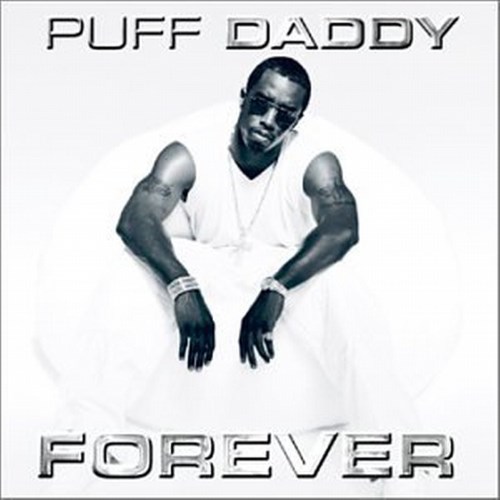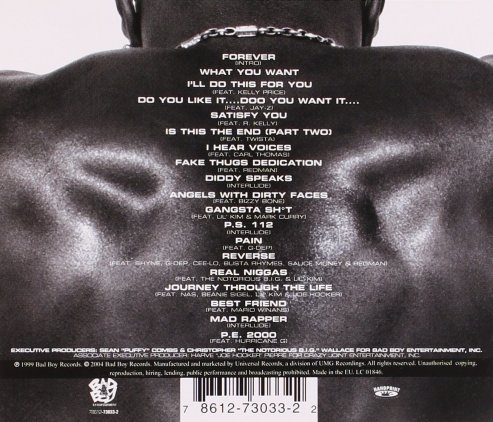
Welcome back to the latest edition of Flashback Friday Flop, a weekly feature in which I examine a hip-hop album from years ago that was considered a flop, either critically or commercially or both, when it was released and see if it has gotten better – or worse – over time.
This week: Puff Daddy’s Forever (1999)
In 1997, Puff Daddy ran hip-hop and, to an extent, all of popular music. That year, his label, Bad Boy Records, released three albums – The Notorious B.I.G.’s Life After Death (10 million sold), Mase’s Harlem World (4 million), and No Way Out (7 million), courtesy of Puff Daddy and the Family – that combined to sell twenty-one million copies and birthed the Shiny Suit Era. As Suge Knight had predicted, the CEO became the star.
But his reign on the top was short like leprechauns.
In losing B.I.G., the label lost its star and its anchor, but also its artistic direction. He had executive produced No Way Out and, along with Mase, Black Rob, Sauce Money, The LOX and others, had written the rhymes that Puff rapped and appeared on some of the album’s best songs, namely, “Victory,” “Young G’s,” and “All About the Benjamins” Remix. He helped bring a vision to the project.
If he had lived, perhaps things would have turned out differently, but regardless, by 1999, Bad Boy was a crumbling empire. Mase had been forced to flee to Atlanta and (temporarily) quit rap just as his second album dropped. The LOX, unhappy with their contract (and their shiny suits), were campaigning to jump ship to their management company, Ruff Ryders.
It was in this atmosphere that came Forever, strictly a Puff Daddy album since he dropped “The Family.” It debuted at #2 on the Billboard chart and was eventually certified platinum, but was disappointing both artistically and commercially, seen as a bloated monument to excess. Without B.I.G. to rein him in or Mase and The LOX to help write, he doubled down on his Puffyness.

It’s been 16 years and so much has happened to Sean Combs. He’s gone through a multitude of name changes (P. Diddy, Diddy, back to Puff Daddy), been an actor on screen (Monster’s Ball) and stage (A Raisin in the Sun), became politically active (“Vote or Die!”), created a hit TV show (Making the Band), been embroiled with beefs and lawsuits with his own artists, and is now a vodka mogul (Ciroc).
So let’s see how Forever sounds to 2015 ears.
The word that immediately jumps out is underwhelming. Puff often likes to compare his albums to motion pictures and Forever feels like a summer blockbuster with a big name director, talented cast, the best CGI, and a hefty budget, but the finished result is barely a movie. Here, there is a talented team of producers (The Hitmen) and an all-star lineup of guest stars (Jay-Z, R. Kelly, Redman, Lil Kim, Bizzy Bone, Twista), but they don’t combine to make anything all that compelling.
Some of the beats knock, but most are just adequate. In 1998 and 1999, hip-hop was obsessed with the millennium and the year 2000, putting it at the end of album titles, referencing it constantly, and trying to create music that sounded “futuristic.” While No Way Out (and later, Jay-Z’s American Gangster, also produced by The Hitmen) sampled old records and looked nostalgic toward the past, this album takes old records and polishes them up with glossy production to try to make them sound like 21st Century beats. It did not turn out well.
On the mic, almost no one sounds excited to be there. It’s as if all of the recording sessions took place on Monday mornings before the artists had any coffee. Jay-Z tries to do something poetic with the word “picture” in every line of “Do You Like It…Do You Want It…” but he sleepwalks through his performance and says little that is new. Bizzy Bone sounds bored on “Angels with Dirty Faces” and Lil’ Kim, an emerging pop star at the time, contributes two guest verses that are brooding and threatening, almost to the point of parody. The same goes for Puff’s ridiculously over the top gun talk on a few tracks, most especially “Real N—s.”
Featuring B.I.G. and Lil’ Kim over a menacing and backbreaking D-Dot beat, this should be a highlight. But it’s a mess. I don’t know who wrote Puff’s verse, but it’s the stuff of wannabe gangsta rappers pointing at themselves in the mirror:
“Just remember there’s a gun to your dome/And I will lick shots and run through your home/Or better yet, I put your son to the chrome/Turn the music up and unplug the phone/I will kill him, read my lips/You too, motherfucker, if I don’t see no bricks/See, I flips when I don’t see no chips/Yeah, n—a, I know you in pain, I don’t care, n—a/I want the stash, keys, hash, weed, G’s, motherfucker, freeze!/Cocksucker, you better bring the things out/Before I blow your motherfuckin’ frame out”
There are enough rumors and proof that Puff has definitely seen and done some shady shit, but this is just ridiculous. Kim’s verse is better, but is full of the same sort of menacing lines. Worst of all, they took a classic Biggie verse and hook from a classic freestyle that is full of backstory and intrigue and put it on a far less interesting song, wasting the verse and the beat in the process.
The back end of the album holds up slightly better than the first half. The beats are crisper and a few of the features actually work. “Reverse” is a posse cut that features great performances from Redman and Sauce Money and decent turns from Cee-Lo and Busta Rhymes. The album’s best song is “Journey Through the Life,” a great song in which all three participants bring it with thrilling verses over a haunting beat. Whomever wrote Puff’s verse (Sauce?) deserved a bigger check, Beanie Sigel sounds fierce with his street sense and wordplay, and Nas is Nas.
But that’s an exception. Most of this is just mindless filler.
Puff has always been castigated for flipping hit songs, but at least at the beginning he was sampling ’70s and ’80s hits from other genres. To hear him snatch the “I Got 5 On It” beat and turn it into an R&B hit – the song reached #2 on the Billboard Hot 100 and spent six weeks atop the R&B chart – or Mobb Deep’s “Right Back At You” for “Pain” only four years after both of those two songs dropped was taking it too far.
The lead single, “P.E. 2000,” was another retread, a remake/cover of Public Enemy’s classic “Public Enemy #1” and it’s telling that it is buried as the last track on the album. It takes an hour to get there and after all that waiting, it’s just more disappointment. It doesn’t come close to matching the greatness of the original.
In a nutshell, the thing that is missing from Forever is a sense of direction. There was a team of cooks in the kitchen for No Way Out, but they were all part of Bad Boy and most had worked together before, so the album had a cohesion, not only sonically and lyrically, but also in tone and vibe. In contrast, Forever encapsulated all of the flaws of post-B.I.G. Bad Boy: gaudy, bloated, overly polished – even the cover reflected the glossy sheen of the late Shiny Suit Era – and put together by mercenaries with no shared vision or goal. It’s obvious he needed “The Family.”
It was Puffy’s Frankenstein monster, an experiment gone wrong.
Previously in Flashback Friday Flop:
Tha Doggfather | Blood in My Eye | The Best of Both Worlds | Can-I-Bus | Beats, Rhymes and Life | Encore | Immobilarity | 14 Shots to the Dome
Christopher Pierznik is the author of eight books, all of which can be purchased in paperback and Kindle. His work has appeared on XXL, Cuepoint, Business Insider, The Cauldron, and many more. He has been quoted on Buzzfeed and Deadspin. Subscribe to his monthly reading review newsletter or follow him on Facebook or Twitter.
One reply on “Flashback Friday Flop: “Forever””
No Way Out was very good in spite of Puff. You had guys like Biggie, Jay, and Mase picking up the slack and good production. Not enough of that on this album to make up for Puff’s shortcomings on the mic. That song using the same Club Noveau sample as The Luniz used was TRASH!
The videos for PE 2000 were funny though, especially watching Puff try to rap in Spanish.
LikeLike